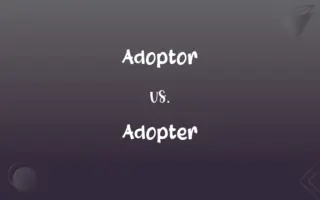Conclusion vs. Finally: What's the Difference?
Edited by Aimie Carlson || By Harlon Moss || Updated on November 3, 2023
Conclusion refers to the end or final part of something, while finally means after a long time or at last.

Key Differences
Conclusion signifies the end point or the summation of an argument, a speech, a piece of writing, or an event. It is a noun that encapsulates the final part of something, often containing a summary or a decision reached after consideration. Conclusions are drawn from the information presented and are an integral part of structured reasoning.
Finally is an adverb that denotes the end of a series of events, actions, or steps. It often implies that there has been a wait or a series of delays leading up to this terminal point. Finally can also indicate a sense of relief that something has concluded or that a change has occurred after a period of constancy.
Conclusions are outcomes or decisions, and they can also be used as indicators of the results of an experiment or a discussion. They mark the place in narratives or logical sequences where the summing up begins. This term carries with it an air of finality and resolution.
Finally is used to transition to the last point in a discussion, signaling a progression rather than a definitive end. It can be used to introduce the last item in a list, the last event in a sequence, or to highlight that after many stages, the end has come. The use of finally implies that what follows has been anticipated or delayed.
While conclusions are the actual end products or statements, finally is about the sequence and the relief or finalization that comes with the end. Conclusion is a destination; finally is the journey's end.
ADVERTISEMENT
Comparison Chart
Part of Speech
Noun
Adverb
Function
Denotes the end or summary of something
Indicates the end of a process or sequence
Use in Sentences
Used to introduce final points or summaries
Used to signal the last in a list or sequence
Implication
Outcome, result, or final statement
Sequence completion or long-awaited event
Common Phrases
"In conclusion," "the conclusion of"
"Finally arrived," "and finally"
ADVERTISEMENT
Conclusion and Finally Definitions
Conclusion
The final part of something.
He read the conclusion of the report with satisfaction.
Finally
After a long time, at last.
She finally finished writing her thesis.
Conclusion
A judgment or decision reached by reasoning.
The jury reached a conclusion after much deliberation.
Finally
At the end of a series of events.
Finally, after all the speeches, the ceremony began.
Conclusion
The summing up of an argument or text.
Her essay's conclusion effectively summarized her main points.
Finally
Used to introduce the last in a list.
Finally, I would like to thank my family.
Conclusion
The last step in a process.
The project's conclusion was marked by a celebratory event.
Finally
As the last point or action.
He packed everything and finally turned off the lights.
Conclusion
The end or finish of an event or process.
The concert came to a powerful conclusion.
Finally
Indicating the end of a list or sequence.
Finally, we must consider the impact on the environment.
Conclusion
The close or last part; the end or finish
The conclusion of the festivities.
Finally
Forming or occurring at the end; last
The final scene of a film.
FAQs
Is it correct to say 'in finally'?
No, the correct phrase is 'finally' or 'in conclusion'.
Does a conclusion have to be factual?
A conclusion is often based on facts, but it can also be opinion-based.
Can conclusion be used as an adverb?
No, conclusion is always a noun.
Can finally be used to express relief?
Yes, it often expresses relief that something has ended.
Can finally refer to something that happens in the end?
Yes, it refers to events that occur at the end.
Can finally be used in the middle of a story?
It can be used if signaling the end of a portion of the story.
Is it proper to start a paragraph with conclusion?
Yes, particularly in formal writings or speeches.
Is finally always the last word in a sentence?
No, finally can appear at the start or in the middle as well.
Are conclusions always at the end of writings?
Yes, they typically appear at the end of essays, reports, etc.
Can a conclusion be a part of a process?
Yes, as the final stage or outcome of a process.
Is it correct to say 'to a conclusion'?
Yes, indicating moving towards an ending or resolution.
Is there a verb form of conclusion?
No, conclusion is solely a noun.
Is a conclusion always the truth?
Not necessarily; it's a reasoned ending which could be subjective.
Can finally be used to start a concluding sentence?
Yes, to denote the end of discourse.
Does conclusion imply a logical ending?
Yes, a conclusion is often the logical end to a premise or discussion.
Can finally be used to indicate impatience?
Yes, it can indicate impatience for something to end.
Is finally a conjunction?
No, it is an adverb.
Can finally be used in academic writing?
Yes, but sparingly and appropriately.
Does conclusion have synonyms?
Yes, such as ending, summary, or result.
Can finally be used to show sequence?
Yes, it can indicate the final part of a sequence.
About Author
Written by
Harlon MossHarlon is a seasoned quality moderator and accomplished content writer for Difference Wiki. An alumnus of the prestigious University of California, he earned his degree in Computer Science. Leveraging his academic background, Harlon brings a meticulous and informed perspective to his work, ensuring content accuracy and excellence.
Edited by
Aimie CarlsonAimie Carlson, holding a master's degree in English literature, is a fervent English language enthusiast. She lends her writing talents to Difference Wiki, a prominent website that specializes in comparisons, offering readers insightful analyses that both captivate and inform.







































































